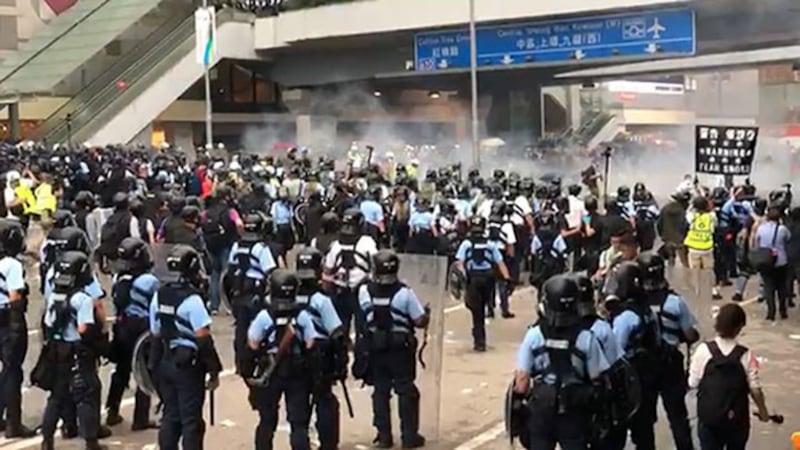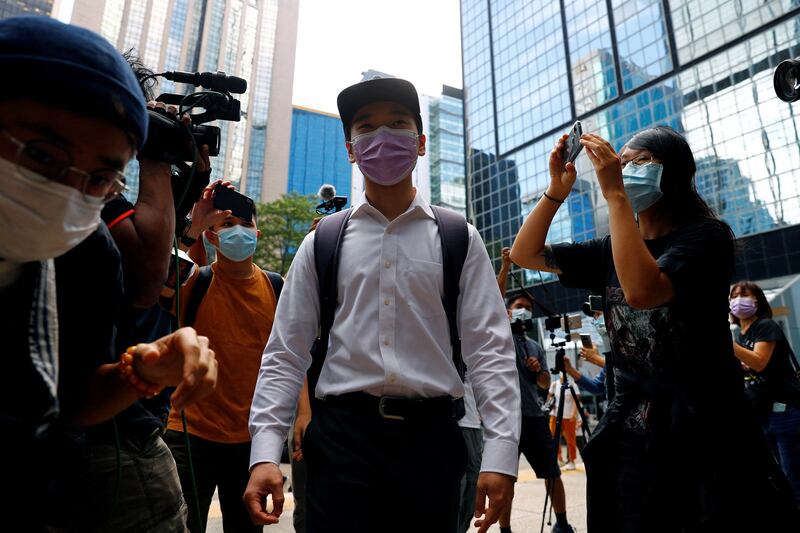A court in Hong Kong on Wednesday handed down a four-year jail term for “rioting” to a protester who was shot in the chest by police during the 2019 protest movement.
Tsang Chi-kin, who was 18 when he was shot by an officeron Oct. 1, 2019, during protests on the 70th anniversary of Chinese Communist Party rule, was given a 40-month jail sentence for "rioting" and a seven-month sentence for "assaulting a police officer."
Tsang, now 22, was also handed an 11-month sentence for "perverting the course of justice," but also received a 35% sentence deduction for expressing remorse, and for actively assisting the police in their investigations, Deputy District Judge Ada Yim told the district court.
Multiple media reports and social media accounts posted video showing protesters flailing at armed riot police with batons and sticks during clashes in the New Territories town of Tsuen Wan.
The officer is shown in the video pointing a handgun at Tsang, a secondary school student at the time, before a shot rings out and the boy slumps to the ground.

Social media posts from the scene on Tsuen Wan's Hau Tei Square said Tsang shouted out: "My chest hurts a lot," adding his full name and identity card number before being taken away by ambulance.
The shooting sparked widespread condemnation of the police and their handling of the months-long protest movement, in which predominantly young people thronged the streets and occupied the city's legislature and airport in a bid to end the erosion of their promised freedoms under Chinese rule.
Sought asylum
Tsang went into hiding for two years after a failed bid to seek asylum at the U.S. Consulate in Hong Kong. He told journalists that his rejected attempt had plunged him "into hell," prompting him to hide from the authorities.
He later pleaded guilty to all charges, citing depression and health problems from the gunshot injury, but Judge Yim said this wasn't taken as a mitigating factor.
"Tsang Chi-kin came well-prepared with a homemade shield and a metal baton," Yim told the sentencing hearing. "He and other demonstrators pursued a lone police officer and relied on the strength of their numbers to use violence, which was of a vile nature."
Tsang, who skipped bail following his initial arrest, told the court that he was "extremely confused" by the prevailing political atmosphere in 2019, and had made "wrong decisions" that he later came to regret.

He also cited his "active cooperation" and testimony as a witness for the prosecution.
However, Yim said the protesters' actions were premeditated, and that demonstrators in the area had thrown petrol bombs, bricks and committed arson, risking injury to police and passers-by.
She said the sentence had to act as a deterrent, and show the court's determination to safeguard public order.
Silent protest
As Tsang received his sentence, the city's police force was out on the streets and on university campuses trying to recruit new officers, sparking a silent protest from a student at a university in Shatin.
Police recruiters faced off on the campus of Hang Seng University with a student who held up a placard scrawled with the words: "Where were you on July 21, 2019?" in a reference to a delayed police response to mob attacks on protesters and train passengers at Yuen Long MTR station.
The city's police force, which quashed a critical report from an international panel of experts on its handling of the 2019 protests, has struggled in recent years to find fresh recruits.
Despite being allocated huge amounts of fresh funding in the wake of the 2019 protest movement, the force has been struggling to fill its additional vacancies, thousands of which have been filled by allowing officers to work past the usual retirement age of 55.
Translated by Luisetta Mudie. Edited by Malcolm Foster.
